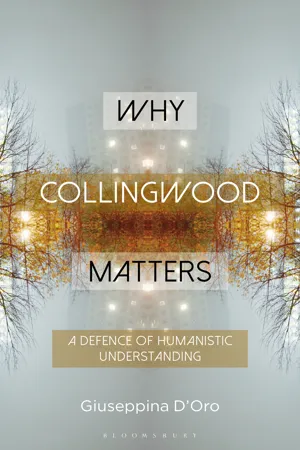
- 232 pages
- English
- ePUB (mobile friendly)
- Available on iOS & Android
About this book
R.G. Collingwood (1889-1943) was an English philosopher, historian and practicing archaeologist. His work, particularly in the philosophy of action and history, has been profoundly influential in the 20th and 21st century. Although the importance of his work is indisputable, this is the first book to consider how and why it actually matters. Giussepina D'oro considers the importance of Collingwood as a thinker who thinks kaleidoscopically and, unlike lots of contemporary philosophers, refuses to focus on narrow, technical interests but instead, observes the whole world of thought. Why Collingwood Matters revives Collingwood's conception of the role and character of philosophical analysis and shows how it informs his understanding of the mind, what it means to act, and what it means to understand the past historically. It also argues for the relevance of his metaphilosophical approach to the challenge posed by the Anthropocene and the global environmental crisis. Both an elucidation of Collingwood's thought and a lively exploration of it's contemporary relevance, Why Collingwood Matters provides a much-needed examination of a 20th-century polymath.
Frequently asked questions
- Essential is ideal for learners and professionals who enjoy exploring a wide range of subjects. Access the Essential Library with 800,000+ trusted titles and best-sellers across business, personal growth, and the humanities. Includes unlimited reading time and Standard Read Aloud voice.
- Complete: Perfect for advanced learners and researchers needing full, unrestricted access. Unlock 1.4M+ books across hundreds of subjects, including academic and specialized titles. The Complete Plan also includes advanced features like Premium Read Aloud and Research Assistant.
Please note we cannot support devices running on iOS 13 and Android 7 or earlier. Learn more about using the app.
Information
Table of contents
- Cover
- Halftitle Page
- Title Page
- Dedication Page
- Contents
- Preface
- 1 The struggle against scientism
- 2 Philosophy as disentanglement
- 3 Causal exclusion and the elephant in the room
- 4 The ‘limits’ of science
- 5 History as the study of mind
- 6 The past as it always was
- 7 Beyond scientism and historicism
- 8 The historical past and the nature/culture distinction at the time of the Anthropocene
- 9 The manifest and the scientific images
- References
- Index
- Imprint